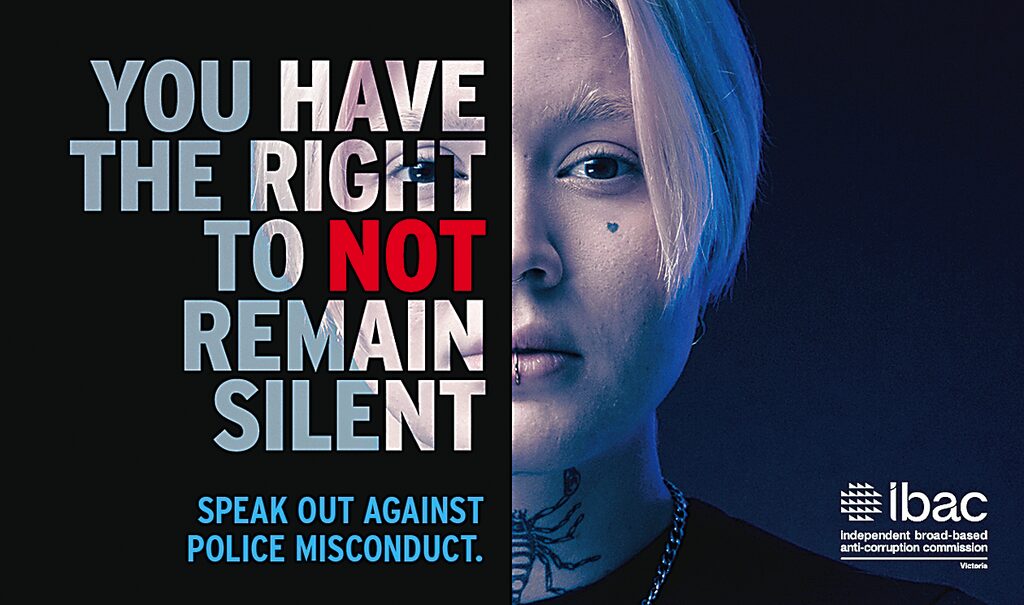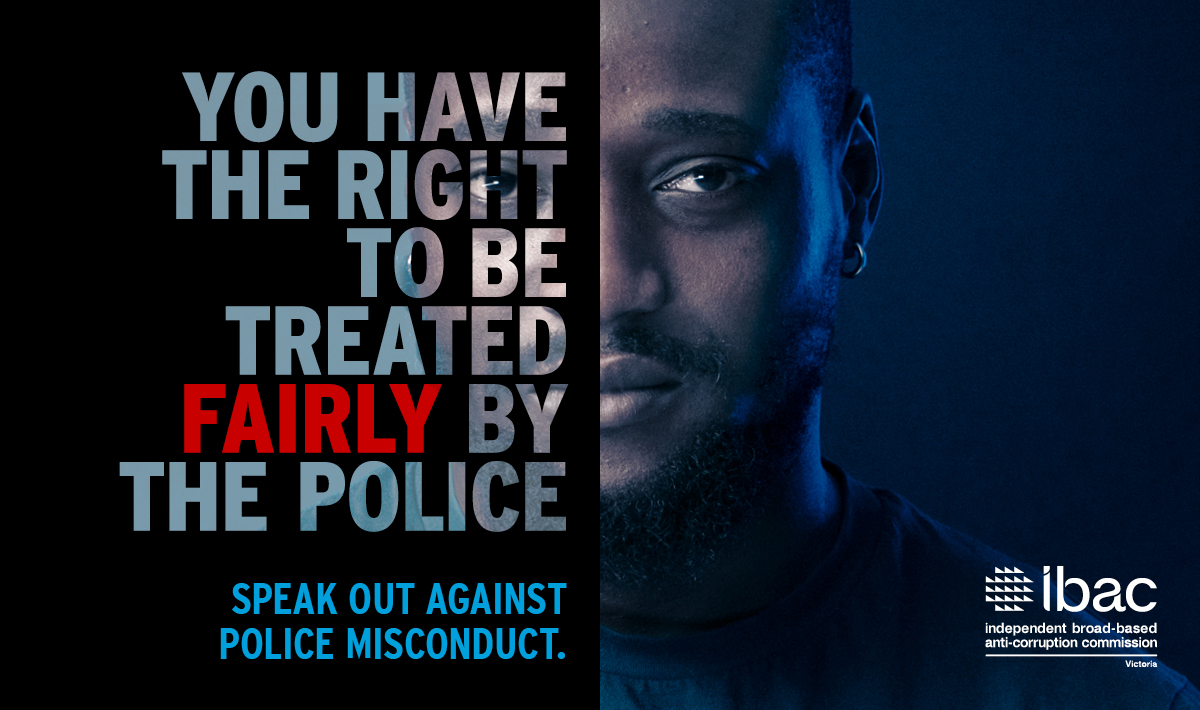
Stefan Bradley
THE Independent Broad-based Anti-corruption Commission (IBAC) is encouraging regional communities to speak out against police misconduct.
IBAC’s ‘You have the right to not remain silent’ campaign is raising awareness of IBAC’s police oversight role, and empowering the community to report suspected police misconduct, or provide information anonymously.
IBAC has independent oversight of Victoria Police to ensure police act impartially, professionally in accordance with the law, and with respect to human rights.
IBAC Deputy Commissioner Kylie Kilgour told the Gippsland Times she believes not enough people know about IBAC, nor that it looks at police misconduct.
“That’s why we are doing this campaign. Most people associate (IBAC) with politicians and the public sector,” Ms Kilgour said.
“People perhaps think that only serious misconduct should be reported to IBAC, but our police conduct jurisdiction is very broad, and we can look at anything to do with police misconduct.
“One example is misuse of police information. We’ve looked at cases where police have accessed their databases which contain information on individuals and they’ve misused that information. We can take complaints on that.
“And away from police, we can also look at things happening in the local council, and people do report what’s happening with the Local Government Area, and that’s usually to do with procurement matters and the spending of public money at the local level. Those reports can be made to us.”
IBAC’s intelligence suggests there may be incidents of police misconduct that go unreported by the public, particularly in parts of regional Victoria.
“Often the police officers don’t move around as much in the metro areas,” Ms Kilgour said.
“Corruption affects all Victorians, and just because you’re a long way from Spring Street doesn’t mean you shouldn’t be able to speak up about police misconduct.
“We do hear from people in Gippsland, but we are concerned that perhaps people don’t know about IBAC, and we’re not getting all the information we should be getting from those who are concerned about police behaviour.
“We are based in Melbourne, and we haven’t the ability to get out and about the way we want to.”
Ms Kilgour said there were however some advantages being based in Melbourne, as IBAC can deal with the officer involved at arm’s length. She said those in smaller communities who feel helpless should call IBAC, as they will protect the identity of whistle blowers.
“We can administer an act called the Public Interest Disclosures Act, which is essentially whistle blower legislation, that allows us to protect people’s identity if they make a report to us,” she said.
IBAC’s jurisdiction covers serious misconduct such as assault, disclosing sensitive police information, major cover-ups, bribery or fraud. IBAC also takes complaints on any conduct which would bring the force into disrepute or cause the public to lose confidence in police, including breaches of human rights such as racism, sexist or discriminatory use of power, degrading treatment, and the safety and wellbeing of a victim or complainant.
IBAC received more than 1600 complaints relating to Victoria Police in 2021, accounting for 55 per cent of IBAC’s total complaints received.
While its limited resources require IBAC to refer many complaints to Victoria Police for investigation, IBAC reviews and audits police investigations to help ensure Victoria Police appropriately discharge their responsibility for police misconduct and identify policies and practices that need to be improved.
Ms Kilgour said the most common complaint about police is excessive use of force.
“We’re very concerned about that and they should be reported so IBAC can take action,” she said.
“I’ve got a particular concern about OC spray (capsicum spray), so if anyone wants to report to us about inappropriate use of OC spray, we’d like to hear from them.
“OC spray is meant to be a substitute for hitting with a baton or drawing a firearm, but on occasion we see OC spray used too aggressively… and sometimes OC spray is used as a form of summary justice.”
IBAC Commissioner, The Honourable Robert Redlich AM, QC said IBAC takes all complaints seriously and information provided by the public helps prevent and expose police misconduct.
“IBAC recognises how challenging it can be for someone to make a complaint about suspected police misconduct. These challenges may arise for social, economic or cultural reasons, or because it can be upsetting to speak out,” he said.
“IBAC manages complaints with care and sensitivity and treats a complaint as confidential when requested.
“Reporting police misconduct can assist IBAC to address systemic police misconduct issues and improve the conduct of Victoria Police’s internal investigations.”
Asked what the police can do better to deal with this issue, Ms Kilgour said there’s always a need to reinforce the standards.
“Police are held to a very high standard, which is appropriate considering the powers they’re given and their standing in the community,” she said.
“And sometimes I think some police officers forget that. The leadership of the police is to remind them about community expectations, that they need to uphold the law and be very careful about the use of their powers.”
Victoria Police policies and procedures are published in the Victoria Police Manual (VPM), which sets out the professional, ethical and behavioural standards for police, and how to use their powers appropriately.
“We’re not talking about widespread police misconduct or corruption in Victoria,” Ms Kilgour said.
“But there are still a small percentage of officers who do the wrong thing and it’s really important if people have that experience that they speak up about it.
“Whether it’s to us or to police themselves, so that action can be taken. IBAC and the executive command of Victoria Police work together, because none of us want there to be police misconduct.”
Asked if police corruption has gotten better or worse over the years, Ms Kilgour said: “I think there’s a persistent rump of it that hasn’t gone away”.
“I wouldn’t say it’s gotten worse, but unfortunately there’s some enduring misconduct that occurs in all policing jurisdictions. And we have to be very mindful of that and speak up when it occurs.”
Some complaints lead to important investigations that result in disciplinary action and criminal prosecutions. IBAC’s recent Operation Bredbo investigation was initiated from a complaint which came from the public.
Victorians can find out more information about reporting police misconduct to IBAC at ibac.vic.gov.au or by calling 1300 735 135.
Examples of Police Misconduct Investigated by IBAC
Operation Poros: IBAC looked at police use of force at the Moe Police Station in 2017, which led to charges. In January 2020, Latrobe Valley police officer Dallas Howell lost an assault conviction appeal, which was for punching a prisoner in the head multiple times in an attack that was caught on camera.
Handling of complaints made by Aboriginal people: IBAC’s audit report, ‘Victoria Police handling of complaints made by Aboriginal people’, was released in May. The commission examined a number of files and eight of the 54 were linked to Gippsland.
Aboriginal people come into contact with police at a much higher rate than non-Aboriginal people. Despite this, Aboriginal people make very few complaints about police.
Aboriginal community organisations have highlighted a lack of confidence in the police complaints system, driven by concerns about inherent bias in the investigation process, lack of adequate evidence gathering, poor communication with complainants and low substantiation rates.
The report identified police use of force as the most frequent complaint by Aboriginal people, and that a significant number of the complaints and serious incidents involved Aboriginal children and young people.
It also found very few complaints were determined by Victoria Police to be substantiated. In addition, a large proportion of the complaint files contained indications of bias or a lack of impartiality.
Read the full report on IBAC’s website.
Operation Bredbo’s public hearings: CONCLUDED in May, the hearings were part of an investigation into allegations that Victoria Police Detective Sergeant Wayne Dean exploited and misused his position as a police officer for reward to improperly influence people who were involved in commercial disputes or civil litigation. Investigations are ongoing.
Operation Preston: IBAC reviewed a Victoria Police investigation into allegations that the Bairnsdale Police Station social club was improperly involved in the design, production and sale of racist ‘stubby holders’.
The Victoria Police investigation of the allegations against members of the social club resulted in findings of ‘unsubstantiated’, except for one police officer, a former Senior Constable, against whom the allegation was ‘not proceeded with’.
IBAC found the investigation considered each alleged racist element of the stubby holders in isolation, and did not take into account the collective narrative of the design, which if read in sequence depicted the following:
- Police member arrives at a call-out in Bairnsdale;
- Member is called ‘Yadawg’ by an Indigenous person;
- Member deploys capsicum spray (‘Bairnsdale handshake’);
- The capsicum spray is implicated in the person catching alight (‘Not that flammable’), and;
- The member reports back to the station GOANODAAC (‘Gone on arrival, no offence detected, all apparently correct’).
IBAC considered the Victoria Police conclusion that the terms used were not racist as contentious, and inconsistent with Victoria Police values.
On January 16, 2014, IBAC recommended to the Chief Commissioner of Police that the outcome of the investigation be amended to ‘substantiated’ for the former Senior Constable and Serving Sergeant, and that disciplinary proceedings be considered. Victoria Police accepted the recommendation.







